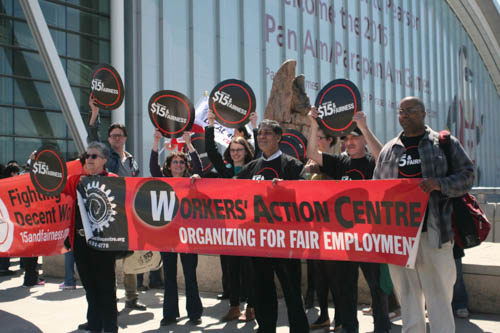Please support our coverage of democratic movements and become a supporter of rabble.ca.
Karen Maleka is a part-time personal support worker. She works in and around Cambridge, taking care of sick people, old people and people who can no longer care for themselves. Each week she works 35 to 40 hours, and yet her employer classifies her as a part-time employee.
I met Karen recently in a Tim Horton’s parking lot on Hespeler road, where she had just hopped off the bus. As we drove towards Guelph, where Karen would share her experiences at a public consultation organized by the Ministry of Labour, I asked her what she planned to say. “I’m going to talk about benefits. Because my employer says I’m part time I have to re-qualify for benefits every year, by working at least 1500 hours. Last year my friend found out she had cancer. She missed a lot of work because she was sick, and so she lost her benefits.”
Ontario’s economy is changing faster than its labour laws, and Karen’s situation is increasingly common. Every year more full time jobs disappear, replaced by part time, temporary, and contract jobs. These precarious jobs are lower waged than similar, full-time work. They come with few if any employment and health benefits, like paid sick or vacation days. They are unpredictably scheduled and lack protections when wages and rights are violated.
Forty-one per cent of working Ontarians do not have standard full-time employment and one in three works for a low wage. So, even if none of the above sounds familiar to you, it will for some of your neighbours, for the person who cares for your mother, pours your beer, or teaches your kid on contract at college.
What’s more, all this bad work has expensive, far-reaching consequences. I work at a food bank in Kitchener, and one in five of our program patrons works. I hear about workers going without dental care, terrified of getting sick, missing a day of work and having to depend, again, on payday lenders. Bad work means ambulances and emergency rooms instead of family doctors and preventative care, cheap calorie rich foods now and chronic diseases later.
These are things we must eventually pay for, because poverty is expensive. In their expansive 2008 report, the Ontario Association of Food Banks calculated that the effects of poverty cost our Federal Government $70 billion annually.
These are avoidable costs, and a very good way to avoid them, and to reduce poverty, is to make work more secure and better paid. These are the twin aims of the provincial $15 and Fairness campaign, which calls for a $15/hour minimum wage, and decent hours, paid sick days, respect at work, and “rules that protect all of us.”
Alberta is getting a provincial $15 minimum wage. Los Angeles, the fourth-largest city in North America, recently signed into law a $15 minimum wage inside city limits.
Heresy of heresies, I know. However, a $15 minimum wage would help to make work a real pathway out of poverty in Ontario. Our current $11 per hour minimum wage puts a full time worker 17 per cent below the poverty line. Working people could use their wages to buy the things they need, in their own communities.
A new report from the Canadian Centre for Policy Alternatives finds “no consistent evidence that minimum wage levels affect employment in either direction.” Some prices would go up, as owners pass costs on to consumers, but a nickel more for a Big Mac seems fair, given what we would gain, and viable businesses could surely absorb new labour costs. Might we also eventually agree that businesses paying poverty wages are never viable?
A $15 minimum wage is not a magic bullet. It is a blunt tool to reduce poverty and save taxpayers money, a quick and relatively easy way to bring minimum wage workers — who are disproportionately female, racialized, and new to Canada — out of grinding poverty.
After sharing about the causes and effects of precarious work, we drop Karen off at her suburban Cambridge home. She’s unusual among her colleagues in owning a home. Many would like to buy, she explains as we pull into the driveway, but no bank will lend to a part-time PSW. I have many more questions for Karen, like “how do you do it!?,” but she has to get ready for her daughter’s high school graduation, happening that evening. She is heading to university next year, Karen says, laughing.
“She wants to be a human rights lawyer,” and then, another laugh, continues, “you know, like, a poor people’s lawyer.”
Get involved!
Please support our coverage of democratic movements and become a supporter of rabble.ca.
This article originially appeared in the Waterloo Region Record.
Image: workersactioncentre.org



